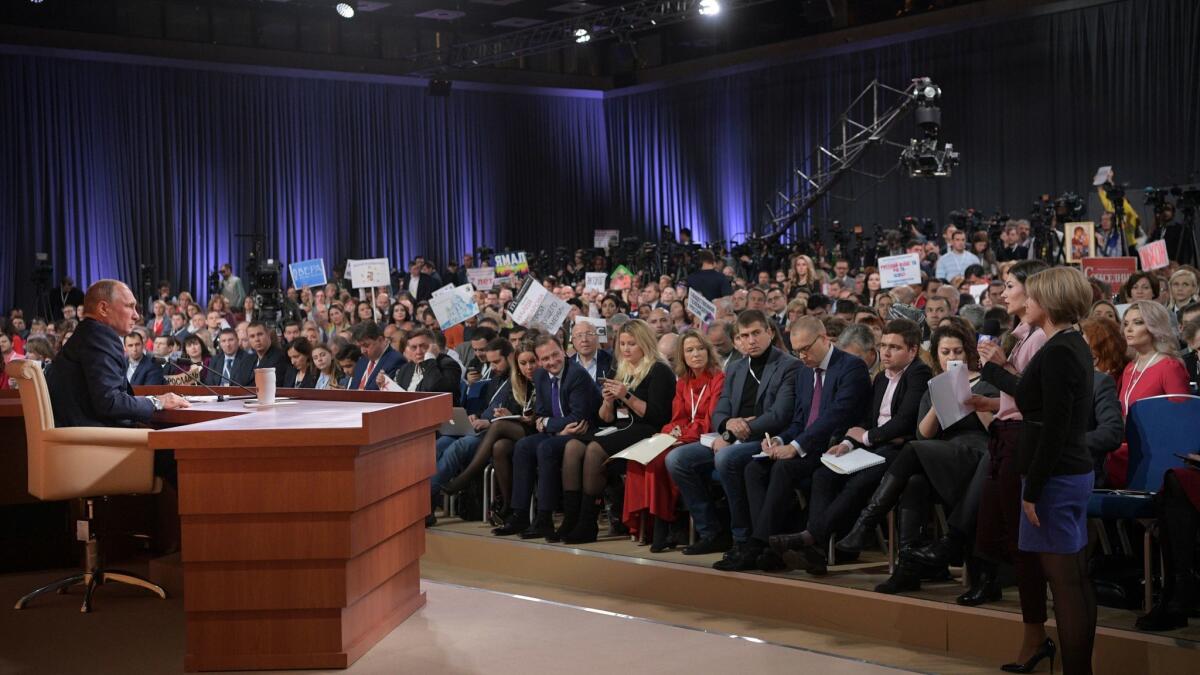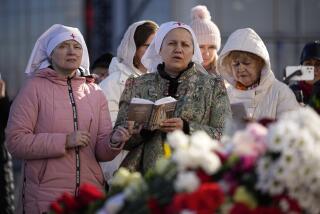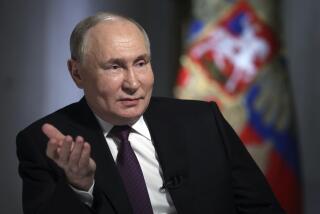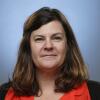Putin says Trump’s opponents have invented ‘spymania’ to block the U.S. president’s agenda

Accusations that Donald Trump’s team colluded with the Kremlin during the 2016 U.S. presidential election campaign are an invention of the American president’s opposition that has sparked “spymania” in Washington, Russian President Vladimir Putin said Thursday.
“You know all of this has been invented, made up by people who are in opposition to President Trump with a view to shedding a negative light on what Trump is doing,” Putin said, responding to a U.S. journalist’s question during his annual marathon news conference in Moscow.
Meetings between Russian diplomatic officials and Trump’s campaign team before the election were routine and normal, and part of a process to figure out what a potential U.S. candidate will do should he or she come to power, Putin said. But those meetings, particularly those involving the former Russian ambassador to the U.S., were twisted by Trump’s opponents.
“For me, it’s very bizarre,” Putin said. “I don’t understand what someone saw there that was out of place in those meetings, and why all this should turn into a kind of ‘spymania.’”
Trump’s efforts to get things done on his agenda, such as healthcare reform and improving relations with Moscow, have been blocked by his opponents, Putin said.
“It’s evident that there are some things he’d like to have done but has been unable to,” the Kremlin leader said. “He was unable to do that due to restrictions” from his opposition.
The Russian president’s response came during his annual press event that feels like part media frenzy and part pre-holiday celebration.
More than 1,600 journalists were accredited for this year’s event, which was held in a crammed conference hall in central Moscow’s World Trade Center.
Putin, who has been in power since 1999 as either president or prime minister, began making the news conference an annual event 13 years ago. Every year, it stretches longer and longer. Like last year’s, this year’s conference lasted nearly four hours.
Putin, now in his 18th year of power, this month announced his intention to run for a sixth term in what is already assumed will be a decisive win in March. Putin’s approval ratings have remained consistently high at 80% since 2014, when Russia annexed Crimea from Ukraine, sparking a wave of patriotic pride that boosted his popularity. Even before that, Russians credited Putin with stabilizing Russia’s economy after the chaotic, post-Soviet years of the early 1990s and bringing Russia’s reputation back onto the world stage.
If Putin is reelected in March, it will be his sixth and final term as president, according to constitutional law, meaning he will stay in power until 2024.
He faces only weak challengers, none of whom expected to get more than 6% of the vote in a general election. Putin attempted to address this imbalance during several questions from Russian journalists, including one from Ksenia Sobchak, a TV news anchor and former reality show host who has declared her intention to run against him.
Russian journalists came prepared to fight their way to get called on for a question. Some arrived in regional costumes, others wore scarves displaying the name of their cities or publications. Most came with placards and signs. “Help the residents of Novorossiysk,” one read. “I want to fly to the moon,” said another.
The conference started with Putin’s press secretary, Dmitry Peskov, introducing ground rules, followed by a dramatic musical sequence that sounded like the start of a sports event, ahead of the president’s entrance.
Putin sat at the table with a glass of water and a microphone.
“Usually I start with economic indicators, and I have them with me. But this time, let’s go straight to questions,” he said.
With that, there was a rush of cards, banners, hands and microphones thrust into the air in the packed events hall.
The first question about Russia’s political opposition — or lack thereof — came from a pro-Kremlin radio station called Govareet Moscow, or Speak Moscow. The journalist wanted to know why Putin has no “serious opposition candidates.”
“Isn’t it boring for you without a strong contender?” the journalist asked in what seemed to be a prearranged question.
“It’s not my job to develop the opposition,” Putin said. “But I will say that I think both our economic and political systems should be more competitive.”
The opposition should not just “make noise in the streets,” but instead come up with a “real agenda people can believe in.”
Without saying the name, Putin was referring to Alexey Navalny, a 41-year-old lawyer turned anti-corruption activist, one of Putin’s challengers in next year’s election. Russia’s central election committee has said Navalny will not be able to register his candidacy because of a 2013 embezzlement conviction. He has vowed to continue his campaign, which has strong support among younger voters. They tune in to his YouTube channel and follow his corruption investigations on social media. The state media outlets do not cover Navalny, meaning a huge segment of the population has little knowledge of who he is.
Navalny released his campaign’s agenda the day before the news conference.
Putin then gestured to a journalist holding a sign that said, in Russian, “Putin baibay,” which the Kremlin leader at first interpreted as meaning “bye-bye.”
“Maybe we should give her the microphone and hear what she has to say,” Putin said, in reference to the question about a lack of political opposition.
The sign, it turns out, was written in the Tatar language, in which “baibay” means “grandfather.”
“OK, sometimes my vision fails me,” Putin joked. The crowd of journalists laughed.
Despite Putin’s criticism about the opposition lacking a serious plan, he seemed vague on his reelection campaign’s own agenda. He said his campaign team and platform were still in the formative stages, but would likely include issues such as salary increases, improvements to the labor market, and the continuation of infrastructure improvements in the education and health sectors.
For the next three hours, Putin answered a wide range of questions that focused on domestic as well as international issues, including Ukraine, North Korea and relations with China.
Sobchak, whose father was a mentor to a younger Putin when she was a child in St. Petersburg, declared her intention to run for president in the March election. She has described her candidacy as “against all,” to mock Russia’s political system as being controlled by political elites.
Her question to Putin mentioned Navalny, saying the opposition candidate has had numerous false court cases brought up against him.
“People realize that to be the opposition in Russia means either to be jailed or killed, or something like that will happen,” Sobchak said, making a reference to Boris Nemtsov, a fierce critic of the Kremlin who was murdered on a Moscow bridge two years ago. “Why does this happen? Is the government afraid of fair competition?”
Putin responded by pointing to Ukraine, where a former Georgian president, Mikheil Saakashvili, is now calling for protests against President Petro Poroshenko.
“Do you want dozens of Mr. Saakashvilis running around our streets?” Putin asked heatedly. He again avoided saying Navalny’s name, but added, “those you mentioned are the same as Saakashvili. So you want those Mr. Saakashvilis destabilizing the country? Do you want us moving from one Maidan-style coup d’état to another?” referring to the 2014 uprising in Ukraine.
Twitter: @sabraayres
Ayres is a special correspondent.
More to Read
Start your day right
Sign up for Essential California for news, features and recommendations from the L.A. Times and beyond in your inbox six days a week.
You may occasionally receive promotional content from the Los Angeles Times.







